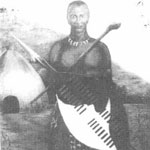This Day in History: April 14, 1906
Additional Date: April 14, 1906
One of the roots of the Bambata/Bambatha Rebellion can be traced to the sustained pressure by colonial authorities on traditional societies in order to force indigenous peoples into the European controlled labour market. Discontent was welling up among many of the Black people in Natal, particularly with regard to the allocation of land for sugar plantations and the heavy tax burdens that the Colonial Government imposed on Blacks in Natal. After King Dinizulu was deposed by the Natal Government, the traditional way of life of the Zulu people came under renewed pressure, as the colonial administration continued with its policy of subjecting pre-Colonial social structures to the Colonial purpose. This policy was known as indirect rule.
Bambata was born in 1865 in the Mpanza Valley. He was chief of the Amalondi, who occupied areas of Mvoti, New Hanover, Umgeni the Lions River Magistracies. He was considered an expert marksman. According to colonial records, Bambatha had a reputation for being troublesome, and the Colonial Government was steadily proceeding to the point where they would depose him as a traditional leader. Bambatha knew of this plot, and it is unclear whether the charges of non payment of taxes were genuine, or a plot to unseat him. When summoned to face the Magistrate in Greytown, on these charges, Bambata, instead sent the elders of his chieftaincy to represent him.
Among the first indications of a brewing rebellion, was the killing of a farmer, Henry Smith, on the 17 January 1906 by one of his workers. When questioned during his trial, the worker admitted to killing the farmer out of resentment for having to enter in a labour relation with him in order to pay tax. In response to Bambata's refusal to pay taxes, the Colonial Government of Natal sent an armed force to arrest him. Bambatha fled to the Mpanza Valley with his family and was given refuge by the Zulu king, Dinizulu. On 14 April 1906, the Natal Government offered a reward of £500 for the capture of Bambata. Upon return to his chieftaincy, Bambata discovered that the Colonial Government had installed his uncle as ruler in his place. After deposing his uncle, Bambata and his followers fled into the Nkandla forests and from there proceeded to wage a guerrilla war against the Colonial Government. Government measures to suppress this rebellion by Bambata, only served to garner him more support among the Zulu people, and many chieftaincies joined with him. On 5 May 1906, Bambata's forces engaged a colonial force dispatched to end the rebellion for good. The colonials, armed with firearms inflicted heavy losses on Bambata's forces. Bambata was forced to flee, but his forces were tracked to the Mome Gorge. In the battle that followed, Bambatha was captured and killed on 10 June 1906.
References:
The Bhambatha Rebellion,(online), available at: greytown.co.za [Accessed 5April 2010]
The Bambata Rebellion of 1906,(online), available at: militariacollector.co.za [Accessed 5 April 2010]
Gillings. K, (date unknown), The Death of Bambatha Zondi: A recent discovery, Military History Journal, Vol. 12, No.4 (online), available at: samilitaryhistory.org[Accessed 5 April 2010]
Bambatha Rebellion(online), available at: sahistory.org.za [Accessed 5 April 2010]
